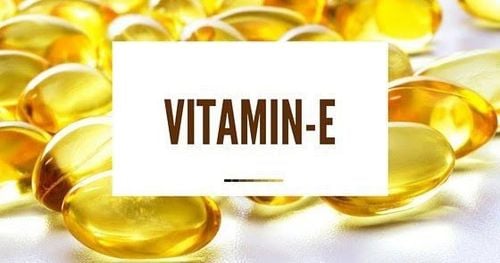This is an automatically translated article.
Vitamin E is a fat-soluble vitamin that is widely distributed in food so vitamin E deficiency is rare, but can still occur in people who are unable to absorb vitamin E. may consider using Alpha Tocopherol as a supplement.
1. What is Alpha Tocopherol?
Alpha Tocopherol drug, also known as vitamin E (commonly found on the market as vitamin E Alpha Tocopherol 400 IU), this is one of the essential vitamins for the body. So what is d-Alpha Tocopherol?
Alpha Tocopherol consists of a d (d-alpha tocopherol) isomer that is more active than a mixture of d and l (dl-Alpha Tocopherol) isomers. Unit of calculation of Tocopherol drug: 1 international unit (unit) is equivalent to the activity of 1mg vitamin E preparations dl- Alpha Tocopherol acetate;
d– Alpha Tocopherol acetate has a potency of 1.36 units/mg; dl– Alpha Tocopherol succinate is 0.89 units/mg, d- Alpha Tocopherol succinate is 1.21 units/mg; dl– Alpha Tocopherol is 1.1 units/mg; d - Alpha Tocopherol is 1.49 unitsqt/mg. Alpha Tocopherol is usually made in the form of tablets of 100đvqt, 200dvqt, 400dvqt, 500dvqt, 600dvqt, 1000dvqt, or capsules of 100dvqt, 200dvqt, 400dvqt, 500dvqt, 600dvqt, 1000dvqt, 200mg, 400mg, 600mg. In addition, Alpha Tocopherol is also prepared in the form of capsules dispersed in water: 100dvqt, 200dvqt, 400dvqt; sugar coated tablets/tablets 10, 50, 100 and 200mg dl- Alpha Tocopherol acetate; ointment Alpha Tocopherol 5 mg/1g; oil solution injection drug 30, 50, 100 or 300 mg/ml used for intramuscular injection, oil solution injection drug 50 units/ml...
2. Alpha Tocopherol's Mechanism of Action
Vitamin E is a general term for natural and synthetic compounds with the most important group of substances being tocopherol drugs, in which Alpha Tocopherol with the strongest activity is mainly used in treatment. In addition, other classes of tocopherol drugs including beta, gamma and delta tocopherol are not used in treatment. Alpha Tocopherol is a fat-soluble vitamin, widely distributed in food, especially vegetable oils, especially wheat germ oil, sunflower oil, cottonseed oil, cereals and eggs. However, Alpha Tocopherol will be lost during storage and cooking. The daily requirement for Alpha Tocopherol is about 4 - 15 mg. Alpha Tocopherol deficiency is rare, occurring only in people who are unable to absorb vitamin E or have an inherited disease that prevents normal blood levels of vitamin E from being maintained.
The exact biological function of Alpha Tocopherol is not fully known, but it is considered an antioxidant, preventing the oxidation of polyunsaturated fatty acids (this is a component of cell membranes). , phospholipids and plasma lipoproteins), when free radicals are generated, they have the ability to damage cell membranes, proteins, and nucleic acids, leading to cell dysfunction and disease. Alpha Tocopherol reacts with free radicals to lose peroxyl radicals but not to generate more free radicals.
Due to the antioxidant properties of Alpha Tocopherol , there have been many studies using vitamin E to alleviate symptoms of dementia
in Alzheimer's disease, age-related macular degeneration, cancer, sclerosis Arteriosclerosis, coronary artery, cataract...
Alpha Tocopherol dose works to reduce the risk of age-related macular degeneration: vitamin C 500mg/day + Beta carotene 15mg/day + vitamin E 400mg /day and zinc 80mg/day.
Alzheimer's disease and coronary artery disease: Alpha Tocopherol dose is from 200 to 800 units/day, however, it should be noted that doses of 400mg/day or more may increase mortality.
3. Uses of the drug Alpha Tocopherol
Alpha Tocopherol drug is used in the treatment and prevention of vitamin E deficiency. It is mainly due to pathology in children with cystic fibrosis of the pancreas or fat malabsorption due to atrophy of the biliary tract, lack of betalipoprotein in the blood, and very mild preterm infants. birth weight or due to the mother's diet deficient in vitamin E. On the other hand, the drug is contraindicated in cases of hypersensitivity to Alpha Tocopherol or to other components of the drug.4. Dosage and usage of Alpha Tocopherol
4.1. For adults Treatment of vitamin E deficiency: 60 - 70 units/day; Prevention of vitamin E deficiency: 30 units/day; Cystic fibrosis of the pancreas: 100 - 200 mg dl- Alpha Tocopherol acetate or about 67 - 135 mg d- Alpha Tocopherol ; Deficiency of betalipoprotein - blood: 50 - 100 mg dl- Alpha Tocopherol acetate/kg or 33 - 67 mg d- Alpha Tocopherol/kg. Beta-thalassemia anemia: Take Alpha Tocopherol 750 units/day; Sickle cell: Take Alpha Tocopherol 450 units/day. 4.2. For children Treating Alpha Tocopherol deficiency: 25 - 50 units/day; In children with Alpha Tocopherol deficiency due to malabsorption syndrome, use Alpha Tocopherol in water dispersible form at a dose of 1 unit/kg/day until the plasma Alpha Tocopherol concentration rises to the normal limit and remains normal for a long period of time. 2 months; Prevention of Alpha Tocopherol deficiency: In low birth weight infants, the dose of Alpha Tocopherol is 5 units/day for the first few weeks; Alpha Tocopherol prophylaxis in preterm neonates or bronchopulmonary dysplasia secondary to oxygen therapy: 15-30 units/kg (10-20 mg Alpha Tocopherol/kg); Neonates with Alpha Tocopherol deficiency secondary to chronic cholestasis may be given a dose of 150-200 mg/kg/day. Alpha Tocopherol should be taken orally, if not, can be injected intramuscularly or intravenously.
5. Alpha Tocopherol side effects
Alpha Tocopherol is generally well tolerated, side effects only occur when high doses of Alpha Tocopherol are used for a long time intravenously, especially when used for premature babies, low birth weight babies.
Some possible side effects when taking Alpha Tocopherol include: Headache, dizziness, blurred vision, nausea, diarrhea, abdominal pain, digestive disorders, necrotizing enterocolitis (pay attention when treating Alpha). Tocopherol for preterm neonates weighing less than 1.5 kg), gonadal abnormalities, breast tenderness, hypercholesterolemia and hypertriglyceridemia, hypothyroxine and triiodothyronin blood.
6. Precautions when using Alpha Tocopherol
High doses of Alpha Tocopherol tend to cause bleeding in patients with vitamin K deficiency or taking anticoagulants; Thrombocytopenia syndrome, hepatomegaly, splenomegaly, ascites, hepatotoxicity/kidney/lung toxicity appeared in some premature infants when intravenous injection of dl- Alpha Tocopherol acetate in polysorbate 20 and 80 solutions; Caution when treating high doses of Alpha Tocopherol above 400 units/day or more in chronic patients has been associated with increased all-cause mortality. Pregnant women have good nutrition, the amount of Alpha Tocopherol in food is enough and does not need to be supplemented; Alpha Tocopherol can be distributed into breast milk, breast milk has 5 times more Alpha Tocopherol than cow's milk and is effective in maintaining adequate levels of Alpha Tocopherol in serum for babies up to 1 year old; Daily requirement of Alpha Tocopherol while breastfeeding is 19mg, only supplement for mothers when the menu does not provide enough Alpha Tocopherol for daily needs.
7. Alpha Tocopherol Drug Interactions
Alpha Tocopherol or metabolites reduce the effectiveness of vitamin K, increase the effectiveness of anticoagulants; Concomitant use of Alpha Tocopherol and acetylsalicylic acid has a risk of bleeding; Alpha Tocopherol can increase the absorption, utilization and storage of vitamin A, helping to protect vitamin A from oxidative degradation thereby increasing the concentration of vitamin A in cells while protecting against the effects of vitamin A. vitamin A excess; Alpha Tocopherol doses above 10 units/kg may delay the response to iron therapy in iron-deficient anemia children. Iron-fortified low birth weight infants may increase hemolytic anemia due to Alpha Tocopherol deficiency; Excessive use of mineral oil can decrease the absorption of Alpha Tocopherol. Cholestyramine, colestipol, orlistat can interfere with the absorption of Alpha Tocopherol so it should be taken at least 2 hours apart. Alpha Tocopherol may increase the risk of blood clots in patients taking estrogen.
Please dial HOTLINE for more information or register for an appointment HERE. Download MyVinmec app to make appointments faster and to manage your bookings easily.













